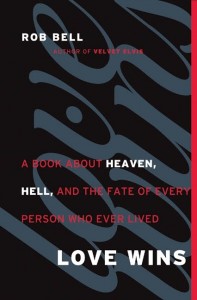Love Wins
By Rob Bell
Library (Book/Audio)
Rating: 6 of 10
I think I gave this book a rating of 6 of 10 because it’s really only half a book. There is so much white space on the pages, that I feel like I mostly read a pamphlet and not an actual book. I find Bell an incredibly gifted and exceedingly compelling communicator and preacher and a not very good writer. I have wept powerfully and uncontrollably several times listening to Bell preach. I have never wept while reading his books. This is not to say that I find nothing helpful in this or other books of his. Perhaps my expectations are too high, but something is missing, and I can’t put my finger on it. Enough about style…let’s get to the content.
Bell offers a vision for heaven and hell that doesn’t fit in any box I have been given growing up in Evangelicalism. He most certainly leans toward a universalism at the most and an inclusivism at the least, but I was taught growing up that these views always ended up with a less than orthodox Christology, or belief in Jesus. The reading that I did while in college complemented this view. John Hick, a classic “Protestant liberal” universalist (every way is a different path up the same mountain), has written of The Myth of God Incarnate. Jesus really wasn’t God. He was just a really great teacher and model who had a uniquely powerful connection to God. Then there’s the issue of God’s very own self. Bishop John Shelby Spong, the controversial Episcopalian bishop, declares that we need to give up a theistic view of God as personal in his book, Why Christianity Must Change or Die. These are the end points, I was taught, for universalism.
But Bell ends somewhere else: an “exclusivity on the other side of inclusivity” (155). For Bell, Jesus is everything I have been taught about him growing up. He is as the Nicene Creed states: “The only Son of God, eternally begotten of the Father, God from God, Light from Light, true God from true God, begotten, not made, of one Being with the Father.” Bell holds an orthodox view of Jesus while at the same time being very optimistic about the salvation of others. This is an intriguing theological mix and one that Bell is not the first to hold in Christian history, as he makes sure we know (107). For Bell, salvation has less to do with entrance and more to do with joyful participation (179). This sounds very much like Wesley’s view of salvation when he says in his sermon The Scripture Way of Salvation:
First, let us inquire, What is salvation? The salvation which is here spoken of is not what is frequently understood by that word, the going to heaven, eternal happiness…it is a present thing; a blessing which, through the free mercy of God, ye are now in possession of. Nay, the words may be rendered, and that with equal propriety, “Ye have been saved”: so that the salvation which is here spoken of might be extended to the entire work of God, from the first dawning of grace in the soul, till it is consummated in glory.
On this point, Wesley sounds a lot like Bell and Bell sounds a lot like Wesley.
On the flip side of things Bell says that “hell is our refusal to trust God’s retelling of our story” (170), and so we live in agony right now like the older son in the parable of the prodigal son who sees his father as a slave master demanding obedience or the younger son who wanders from his father’s love and must ask himself the question of whether he can again be his father’s son. This parable (and others) leads Bell to see heaven and hell not as some separate place but more as a state of being which intermingle with one another. Hell is the older brother being at the party, heaven, but unwilling to participate.
My major critique of Bell is that he has drawn a classic either/or scenario. It seems that for Bell heaven and hell are either separate places or intermingling places. I don’t know why they can’t be essentially both things. I think C.S. Lewis offers a more powerful vision of hell in his book The Great Divorce. In this classic book we see Lewis describing hell as a place that someone chooses both to become and to dwell. The more that they choose this place, the further they move from heaven. There is a kind of gray area in between where shallow hell and shallow heaven are something of a purgatory, and these places touch by way of a daily bus ride between the two. The further one gets into heaven, the more impossible it becomes for them to enter into hell and vice versa. In his introduction to The Great Divorce, Lewis rightly points out that this is fiction and ought not be taken as doctrine, but fiction has a way of helping the imagination as it ponders doctrine. While The Great Divorce has clearly influenced Bell, Lewis does with fiction what Bell is not able to do with nonfiction: hold both a state of being and a place of being in creative tension with one another. The old adage is true: it’s not either/or but both/and.
Currently Reading/Listening
Generation to Generation by Edwin H. Friedman
The Good Man Jesus and the Scoundrel Christ by Phillip Pullman
Exponential by Dave and Jon Ferguson
The Busy Family’s Guide to Spirituality by David Robinson
Parenting with Purpose by Oddbjorn Evenshaug, Dag Hallen, and Roland Martinson
At the Still Point compiled by Sarah Arthur
Caleb’s Crossing by Geraldine Brooks
Ignite by Nelson Searcy


Speak Your Mind
You must be logged in to post a comment.